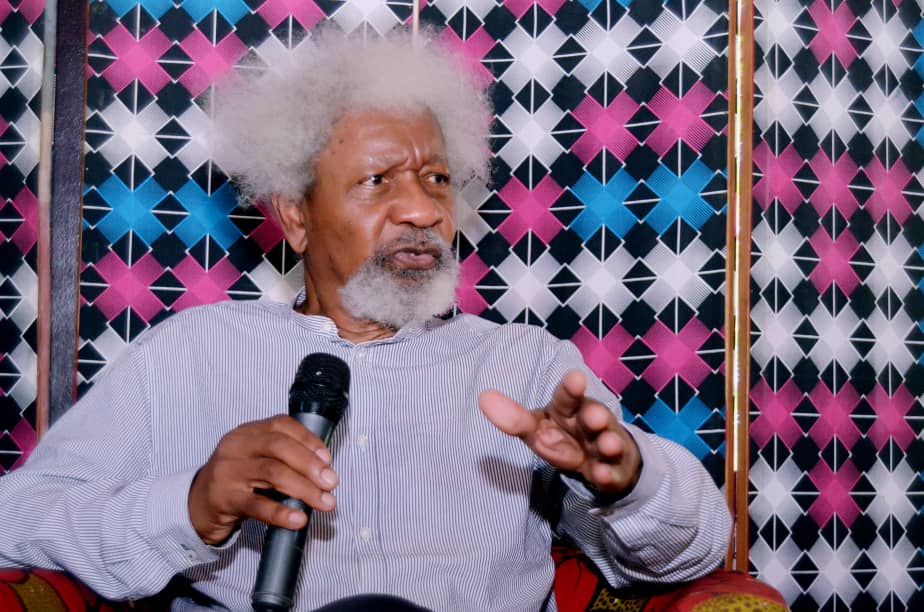“Life is not about being rich, being popular, being highly educated or being perfect. It’s about being real, humble and kind.” – Anonymous
“Justice is the first condition of humanity.” – Wole Soyinka, ‘The Man Died’
“A man is either born to his art or he isn’t.” – Wole Soyinka, ‘Death and the King’s Horseman’
Akin Orebiyii/
It was the morning of December 26, 1983, at the shooting of ‘Blues for a Prodigal,’ a film by Wole Soyinka. The dry, mild harmattan morning was filled with dust and haze. The location was the Rotunda, a small bar tidily tucked away in the vast Oduduwa Hall complex at the University of Ife (now Obafemi Awolowo University) in Ile-Ife, Osun State, Nigeria.
The unique architectural feature of the Rotunda was its round and almost squat-like design with a door and several large, similarly round windows which were almost the size (but not the regular rectangular shape) of french windows. It is like a groove, a fitting rendezvous between two thugs (emissaries of a highly-placed politician) and an undergraduate who chooses to dine with the devil.
As we sat waiting that morning, we watched the film’s production crew, led by ace cinematographer Bankole Bello, set up their equipment. The late Steve Awana from Lagos was in charge of continuity. Soon, the writer and director of the movie, Professor Wole Soyinka, arrived with his secretary, Francis, a wizard with the typewriter and cyclostyling machine. The personal computer was still in its embryo, undergoing pregnancy tests then.
Apart from a few professional actors and technical practitioners, most of us in the Rotunda were students of the Department of Dramatic Arts, where Professor Soyinka was the Head. Word had spread just before the Christmas break that _Prof_ would be conducting an audition for a movie. Eager to participate, many of us students stayed back, hoping for a role. We soon learned that the audition and casting had already been done, and the shooting had started weeks earlier at various locations outside the campus at Ife and even as far as the beautiful and serene Takwa Bay, an islet off the Lagos Harbour.
For this particular scene and a few others at the Rotunda, a few people were needed as bar-room patrons – a crowd scene kind of. Despite realizing it wasn’t a fresh audition for roles, we decided to stay, content to be part of the crowd. After all, being a passer-by or waka-pass (as it is commonly called in Nollywood), in a Soyinka film would be a huge priviledge on its own.

In the bar-room scene, if my memory serves me correctly, two political thugs (_Prof_ christened them Enforcers) meet with a young undergraduate paid to carry out a politician’s assignment. The undergraduate, however, seems reluctant.
By mid-morning, Mr. Bello and his crew were ready, but the rehearsal couldn’t proceed because the person playing the undergraduate (the movie’s lead role), Felix Okolo, was missing. It seemed he hadn’t returned from the Christmas holiday, and with no mobile phones, there was no way to contact him. The now-ubiquitous mobile phone was still nearly a distant two decades away then.
Professor Soyinka paced the floor, thinking. He decided to find a stand-by for Felix so the rehearsal could continue. After a quick search, he spotted me. I was handed a copy of the script and soon found myself opposite the much-storied Jimi Solanke (Enforcer 1) and his ally-in-crime, Jimmy Johnson (Enforcer 2), a television star from Lagos. I felt small and intimidated.
The rehearsal continued till break-time, but Felix still hadn’t shown up. After the break, we rehearsed and shot a few scenes where Felix wasn’t needed. By the end of the day, Felix still hadn’t appeared.
The next morning, _Prof_ asked to see me. He explained that since no one knew when Felix would arrive and they couldn’t afford to lose another day because of the cost of production, he had rewritten a few scenes. To my amazement, the master craftsman had created a new character overnight—a younger brother to Felix named Sope—and transferred most of Felix’s lines to this new character. He had typed the new script himself and asked Francis to quickly prepare copies.
After several rehearsals, the director called for a recording: “Silence! Bar-room noise! Camera rolling, sound, lights…” Just as we were about to start, Felix walked in.
“Cut! Cut! Cut!” the director bawled. You would think this was in itself a scene from a play. Silence reigned in the Rotunda as all eyes shifted from Felix to _Prof_ and back to Felix. Without hesitation, _Prof_ insisted on the new arrangement, saying it would be unfair to ask me to revert to my old role after nearly two days of rehearsal. He promised to adjust the script to accommodate both characters and asked Francis to give Felix a copy of the new script.
This is how the illustrious professor, for whom the Nobel Prize in Literature was still three years away, graciously created a character for little me. He not only gave me a role in his movie but also ensured I was paid N250, a significant sum compared to the N25 I had earned for previous performances. In an instant, I was elevated from the crowd scene to playing a supportive role in the movie.
Years later, when I asked _Prof_ to autograph my copy of his new collection of poems, ‘Samarkand and Other Markets I Have Known,’ at the National Theatre in Lagos, I reminded him of how he gave me a role in “Blues…”, he looked at me with a blank expression. He couldn’t remember the incident. For him, what I cherish remains a brief, forgotten scene in the epic drama of his life.
Beyond the role and the money, _Prof_ left a huge impression on my mind. He didn’t have to create a new character or spend beyond the original budget to ensure fairness. Yet, he did, going the extra mile and paying the extra cost. This incident testifies to the life of a man who will go to great lengths for the sake of justice.
A man is defined not only by his achievements but also by the kindness he shows to others who may never be able to pay back. Greatness is determined by the simple, kind things we do for others.
As Oluwole Akinwande Soyinka turns 90, I join the voices of many others whose lives he has touched:
Happy 90th birthday, Kongi!
“The elephant deserves better than that we say ‘I have caught a glimpse of something.’ If we see the tamer of the forest, let us say plainly, ‘we have seen an elephant.'” – Wole Soyinka, ‘Death and the King’s Horseman’
[This brief account of Soyinka’s gracious gesture is an excerpt from ‘Moments with Jimi Solanke,’ a tribute I wrote earlier this year in honour of Jimi Solanke, singer, actor, and artist extraordinaire who left the flesh on February 8.]
–Akin Orebiyii
July 13, 2024
(Orebiyii is a farmer in Ibooro, Ogun State, Nigeria)
0




